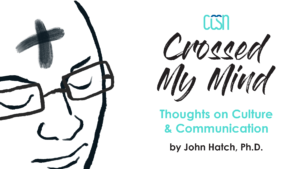 Column title: Crossed My Mind: Thoughts on Culture and Communication
Column title: Crossed My Mind: Thoughts on Culture and Communication
Column entry: “Ashes and Light, Children and Lightness”
By John Hatch, Ph.D.
Eastern University (retired)
CCSN Senior Fellow
Column Description: As Christians, we are called to have the mind of Christ. This goes against the grain of our social and cultural conditioning. We seek personal or political advancement; Christ seeks the lost and the least. We grasp for cultural ascendency; Christ descends to the cross of love. This column is dedicated to thinking about culture and communication under the sign of the cross.
February 2023 / January 2023 / December 2022 / November(2) 2022 / November 2022 / October 2022 / August-September 2022 / June-July 2022 / January 2022 / December 2021 / October-November 2021
February 2023
Ashes and Light, Children and Lightness
As I write, Lent is approaching—the Church’s liturgical season of reflection, prayer, repentance, and self-discipline in anticipation of Holy Week, beginning with Ash Wednesday. In this column, I’m taking a break from my usual focus to reflect on the significance of Ash Wednesday—a day that reminds us how to turn right-side up in God.
The churches I attended as a child and teen did not observe Lent, so when my wife and I started attending an Episcopal church over a decade ago, it took a while to warm up to the idea. Frankly, the idea of getting ashes on my forehead didn’t fit my 21st century American lifestyle and image.
But a few years ago, Christie and I finally took the plunge and attended one of our church’s Ash Wednesday services. As it happened, I misread the church website, and when we arrived for the “family” service, we discovered that the attendees were 80% kids and the service content was tailored to them—including paper bags at each table filled with pretzels (for the pretzel prayer posture), beans (seeds that die before coming to life), and clothespins (to draw little people-faces on and remember that Jesus became human just like us). Bummer! We had come for quietness and soberness and deep adult reflection!
But didn’t Jesus say that “unless you turn from your sins and become like little children, you will never get into the Kingdom of Heaven”? Finding ourselves at the children’s service, we became big kids. We received our pretzels, beans, clothespins, and so forth, and heard Lent explained in down-to-earth, concrete terms. When it came time for the main event, Father Richard made it lighthearted by yelling “ouch!” when Sister Carolyn put ashes on his forehead, and then he smiled and explained not to worry, they’re not hot! We got in line with the kids and their parents to receive our ashes. As he marked an ashen cross on each forehead, Richard said, “Remember you are dust, and to dust you shall return.”
“And to dust you shall return.” Morbid? Too serious for kids? To our American sensibilities, perhaps. But that’s a weakness in our culture. We like to think we can master nature, the economy, our society, our life. We ignore and hide death. We take ourselves and our egos—both individual and collective—too seriously. Instead of giving of ourselves to lift up those of low status and low esteem, we strive to get the esteem we think we are owed.
Jesus’ disciples were worried about esteem, too. As Matthew recounts, “The disciples came to Jesus and asked, ‘Who, then, is the greatest in the kingdom of heaven?’ He called a little child to him, and placed the child among them. ‘Truly I tell you, unless you change and become like little children, you will never enter the kingdom of heaven. Therefore, whoever takes the lowly position of this child is the greatest in the kingdom of heaven’” (Matthew 18:1-4, NIV).
Sounds upside down? Maybe it’s our esteem-crazy world that’s upside down. Maybe children, made in God’s image, start life right-side up, wide open to God’s unconditional love. The system of this world soon conditions them to “stand on their heads” in all sorts of ways to get attention, approval, and conditional love.
Little children expect to be loved, not because they’re powerful and impressive, but because they are pixies made from dust—small and innocent, weak and needy. They expect to be loved simply because they are the offspring of love, and because every (good) parent loves their child.
Kids are “great” in a way that’s quite different from climbing the social ladder. Their greatness lies in receiving love and giving it back—not as repayment, but as a free gift in the image of the love that gave them life. Their greatness lies in being unique conduits through whom love can freely pass to others. They can take themselves lightly, because they know they are lightweight—they have not yet forgotten how small and dependent they are in a vast and wondrous universe.
But as we grow up, the self-important spirit of this world presses us relentlessly, working its way into our minds and hearts and bodies until we unlearn grace and learn to measure our worth by our means and our achievements, our superiority, and our ability to throw our weight around. As G. K. Chesterton puts it, “We have sinned and grown old, and our Father is younger than we.”[i] We forget our lightness, and the light in our eyes becomes darkness. We need to turn—return—find our way home.
“Remember you are dust, and to dust you shall return.” When we take this to heart, we begin to realize the truth that sets us free: this moment is a miracle, a gift, a grace. In our blindness we sin, but God lavishes us with head-spinning grace so we can turn around and see aright. “Us-versus-Them” thinking is not the way of truth and will never produce justice or peace. Comparing ourselves to “those sinners” doesn’t make us good; our goodness springs from our Creator’s gifting and transforming love. Acknowledging our sin is the path back to this reality. Allowing the death of our ego is the passage to resurrection and real life. Humility is not heaviness; it’s a lightness that lets the Wind lift us into the arms of God.
Ash Wednesday reminds me that I’m a grown child of Light, loved into being out of the dust for a season. I have no idea when darkness will fall on my life or my curtain will close. With this awareness, I can dance in the light and take myself (and others) more lightly. I can work through life’s inevitable obstacles and frustrations more gracefully, laugh more whole-heartedly, give more graciously. I can communicate both honestly and graciously, “speaking truth in love.” I can confess and repent instead of denying and self-defending. I can focus on being an agent of mercy and justice to “them,” not just “us.” Eyes cleared and brightened, I can see Christ in “the least of these” and love even those who, in blindness, would make themselves my enemies.
Turn, Turn, Turn. Remember you are dust—and light—and loved.
Notes
[i] G. K. Chesterton, Orthodoxy: The Romance of Faith (New York: Doubleday, 1959), p. 60.

